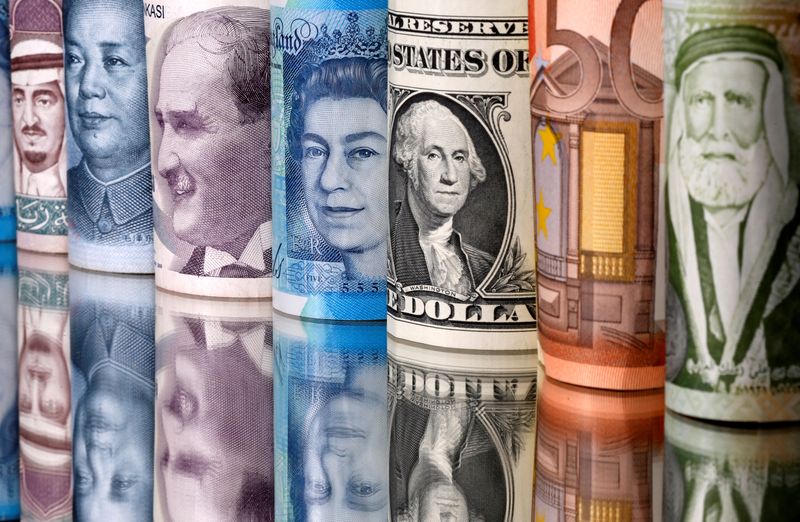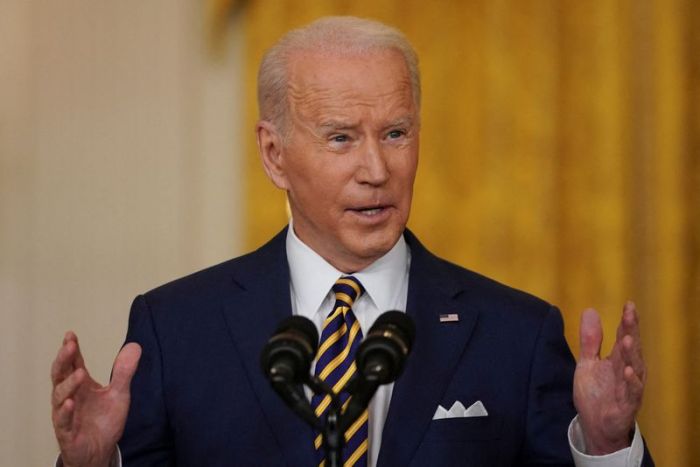By Gertrude Chavez-Dreyfuss
NEW YORK (Reuters) -The dollar slid on Wednesday, with U.S. Treasury yields retreating as well after hitting roughly two-year peaks on 2-year and 10-year notes, but the greenback remains well-supported as investors prepared for a widely expected interest rate increase in March.
U.S. 10-year Treasury yields touched a new two-year high of 1.902% on Wednesday, but was last down 4 basis points at 1.8271%.
Bond yields in other major economies rose as well, with the euro, sterling, the Canadian, Australian, and New Zealand dollars, among others, gaining versus the U.S. currency.
Sterling, meanwhile, rose after data showed British inflation rose 5.4% in December, its highest level in 30 years, raising rate hike expectations. Talks of a leadership challenge to Prime Minister Boris Johnson, however, have kept the pound in check.
“Central banks are now getting evidence that Q4 did not necessarily slow the pace of inflation and in fact, places like the U.K. are experiencing CPI numbers not seen since the early 1990s,” said Juan Perez, senior FX trader and strategist, at Monex USA in Washington.
“We see the buck gaining short term, but do not sleep on other currencies as the pricing in of Fed hikes becomes an after-thought,” he added.
The Fed will meet next week and will likely provide clarity and details on the end of quantitative easing, possibly in March. The U.S. central bank could also signal it will raise interest rates in March as well, right after ending QE.
Fed funds futures have fully priced in a rate hike in March and four in all for 2022.
In afternoon trading, the dollar index was down 0.2% at 95.528.
The greenback trimmed losses after data showed U.S. homebuilding unexpectedly increased in December amid unseasonably mild weather. Housing starts rose 1.4% to a seasonally adjusted annual rate of 1.702 million units last month.
The euro, the largest component in the dollar index, was up 0.2% at $1.1348, after the previous day’s sharpest daily drop in a month.
The single European currency was underpinned overall after Germany’s 10-year bond yield rose above 0% for the first time since 2019 on Wednesday, marking a potential turning point for euro area debt characterised for years by negative yields. [GVD/EUR]
The German 10-year yield, considered a benchmark for the whole euro zone, rose as high as 0.025%, and was last little changed on the day at -0.007% .
The euro, meanwhile, dropped to a 23-month low versus sterling after the red-hot UK inflation data. It was last flat at 83.29 pence. Against the dollar, the pound rose 0.2% to $1.3624 .
The pound was also supported by the surge in UK yields, with the two-year gilt yield rising to 0.958%, its highest level since March 2018.
The Australian dollar rose 0.5% to US$0.7224.
The U.S. dollar edged 0.2% lower versus the Canadian currency to C$1.2492 after Canada’s annual inflation rate climbed to a 30-year high of 4.8% in December.
========================================================
Currency bid prices at 3:10PM (2010 GMT)
Description RIC Last U.S. Close Pct Change YTD Pct High Bid Low Bid
Previous Change
Session
Dollar index 95.5070 95.7140 -0.21% -0.163% +95.7920 +95.4940
Euro/Dollar $1.1352 $1.1327 +0.22% -0.15% +$1.1357 +$1.1319
Dollar/Yen 114.2400 114.5900 -0.31% -0.76% +114.7850 +114.2050
Euro/Yen 129.67 129.79 -0.09% -0.50% +129.9800 +129.4000
Dollar/Swiss 0.9153 0.9175 -0.25% +0.34% +0.9177 +0.9145
Sterling/Dollar $1.3626 $1.3598 +0.22% +0.76% +$1.3648 +$1.3588
Dollar/Canadian 1.2491 1.2513 -0.17% -1.20% +1.2524 +1.2450
Aussie/Dollar $0.7225 $0.7186 +0.54% -0.61% +$0.7238 +$0.7177
Euro/Swiss 1.0391 1.0391 +0.00% +0.21% +1.0403 +1.0375
Euro/Sterling 0.8330 0.8328 +0.02% -0.83% +0.8342 +0.8314
NZ $0.6796 $0.6765 +0.44% -0.72% +$0.6811 +$0.6764
Dollar/Dollar
Dollar/Norway 8.7610 8.8125 -0.58% -0.54% +8.8220 +8.7490
Euro/Norway 9.9445 9.9682 -0.24% -0.68% +9.9947 +9.9215
Dollar/Sweden 9.0959 9.1357 -0.21% +0.86% +9.1551 +9.0906
Euro/Sweden 10.3256 10.3476 -0.21% +0.90% +10.3686 +10.3160
(Reporting by Gertrude Chavez-Dreyfuss; Additional reporting by Joice Alves in London; Editing by Kevin Liffey, Jonathan Oatis and Chizu Nomiyama)























